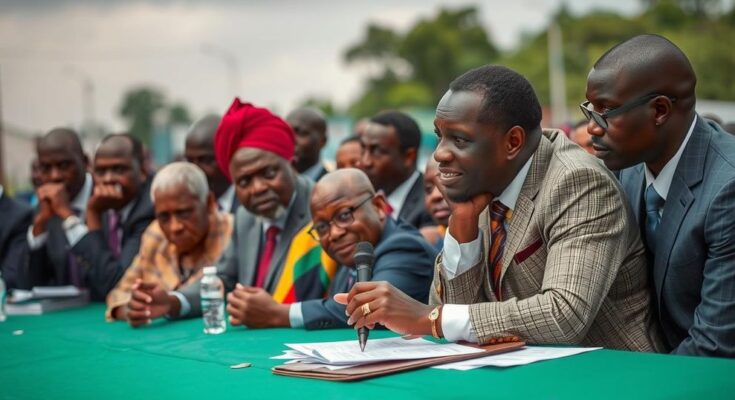The Democratic Republic of Congo and Rwanda have withdrawn from peace talks aimed at addressing the M23 conflict. The M23, a Tutsi-led militia group, exacerbates a humanitarian crisis and raises regional security concerns due to its historical roots in ethnic tensions. Rwanda’s alleged involvement has deepened suspicions, complicating efforts for reconciliation. A renewed negotiation process, with international mediation, is imperative to resolve the crisis and enable stability.
On December 15th, the Democratic Republic of Congo (DRC) and Rwanda announced their withdrawal from proposed peace talks scheduled to take place in Angola. This meeting was intended to bring together both parties to develop strategies aimed at de-escalating the protracted M23 rebel conflict in the Congo, which has been festering for over a decade.
The M23, or March 23 Movement, is a militia group predominantly composed of Tutsi soldiers who defected from the Congolese army. Established in 2012, M23 has intensified the ongoing humanitarian crisis in eastern Congo through widespread civilian attacks and the recruitment of child soldiers. Rwanda’s involvement has raised concerns for Congo, as the Congolese government fears potential collaboration between Rwanda and M23, amidst Rwanda’s claims of threats posed by Hutu rebel groups based in Congo to regional stability.
The conflict’s underlying causes include historical ethnic tensions rooted in events such as the 1994 Rwandan Genocide, which has perpetuated division between the Hutu and Tutsi communities across borders. The escalation of rebel hostilities has severely impacted education and healthcare services available to local civilians. Therefore, there is a pressing need to prioritize peace talks and conflict resolution efforts to prevent further humanitarian degradation.
In a statement made to Voice of America News, Congolese spokesman Giscard Kusema noted, “Rwandans have set a precondition for the signing of an agreement that the Congo hold a direct dialogue with the M23.” Rwanda’s government has suggested it might reduce its defensive measures if Congo were to dismantle a Hutu rebel faction accused of attacks against Tutsis in both nations. Congolese President Felix Tshisekedi has firmly rejected such proposals. The resulting stalemate has prompted international organizations, including the United Nations (UN) and the African Union, to assert that Rwanda is entangled in the conflict. An expert report from the UN cites allegations that Rwanda is backing M23 and has stationed between 3,000 to 4,000 troops within Congolese territory, which Rwanda refutes, claiming its presence is defensive.
A Congolese government source stated that if Rwanda genuinely committed to the negotiations and withdrew its troops, the conflict with M23 could effectively come to an end. The decision by both Congo and Rwanda to withdraw from the peace talks in Angola represents a critical missed opportunity for conflict resolution. The current atmosphere of mistrust between Congo and Rwanda is detrimental to achieving a collaborative resolution regarding ongoing ethnic tensions.
To progress toward peace, a new framework for negotiations is required, where both parties acknowledge each other’s concerns and reach consensus on terms essential for peace. Building mutual trust and respect is vital. Additionally, greater involvement from international entities like the UN and the African Union could aid in mediating discussions, fostering dialogue, and ensuring that troop withdrawal is executed in a timely manner. Such mediation could set the stage for meaningful peace agreements and sustainable conflict resolution in the region.
The unwillingness of Congo and Rwanda to engage in planned peace talks indeed aggravates the existing M23 conflict and exacerbates the human rights crisis in the region. Prioritizing peace is crucial, as failing to do so will likely lead to further destabilization. However, an effective resolution could pave the way for lasting peace, restoring hope for brighter prospects in the region.
The article discusses the recent failure of peace talks between the Democratic Republic of Congo (DRC) and Rwanda concerning the M23 conflict, a recurrent crisis stemming from deep-seated ethnic tensions in the central African region. The M23 group has been responsible for severe human rights abuses, and the involvement of Rwanda complicates the situation further, raising suspicions of ethnic bias. The historical context, originating from the Rwandan Genocide, influences current relations and the urgency for conflict resolution.
The ongoing conflict between the Democratic Republic of Congo and Rwanda underscores the urgent need for renewed dialogue and diplomatic engagement. Without a commitment to peace negotiations, the humanitarian crisis will continue to escalate, primarily impacting vulnerable civilian populations. Efforts toward reconciliation and understanding are essential to halt the violence and restore stability in the region. Ultimately, a collaborative approach that incorporates regional and international mediation is crucial for achieving lasting peace and addressing the underlying tensions that fuel this protracted conflict.
Original Source: theowp.org




